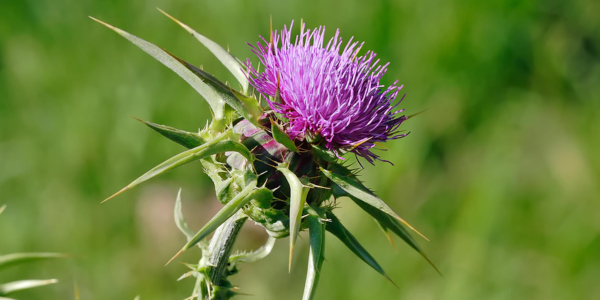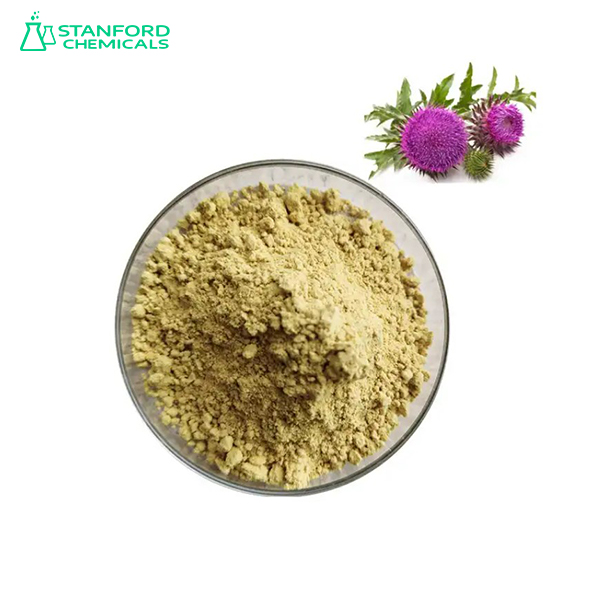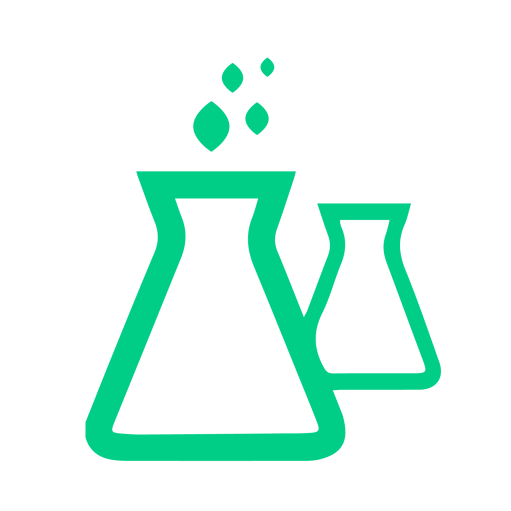
Milk thistle, also known by its scientific name Silybum marianum, is an herbal remedy that has been used for centuries to treat a variety of ailments, particularly those related to the liver and gallbladder. Native to the Mediterranean region, milk thistle is now grown around the world. This plant is easily recognizable by its purple flowers and white veins, which legend says were caused by a drop of the Virgin Mary’s milk, giving rise to its name.

This image shows the Milk Thistle extract, with the purple flowers and leaves of Milk Thistle in the upper right corner.
What is Milk Thistle
Milk thistle is a flowering herb related to the daisy and ragweed family. It is best known for its active ingredient, silymarin, which is extracted from the seeds of the plant. Silymarin is a complex of flavonoids that has antioxidant, antiviral, and anti-inflammatory properties. The seeds of milk thistle are the part most commonly used to make supplements and extracts. Historically, milk thistle has been used as a natural remedy for liver and gallbladder disorders, to promote milk production in lactating mothers, and as a general tonic for well-being.
6 Benefits of Milk Thistle
1. Liver Health
Milk thistle is perhaps most renowned for its liver-protecting effects. Silymarin has been shown to help regenerate liver tissue, reduce liver inflammation, and protect liver cells from damage caused by toxins and alcohol. This makes it beneficial for people with liver conditions such as cirrhosis, jaundice, hepatitis, and gallbladder disorders.
2. Antioxidant Properties
The antioxidant properties of silymarin help to neutralize harmful free radicals, which can damage cells and lead to chronic diseases. This antioxidant effect also helps to reduce oxidative stress, which is a major factor in aging and many diseases.
3. Anti-inflammatory Effects
Milk thistle has powerful anti-inflammatory properties, which can help to reduce inflammation throughout the body. This makes it useful in the treatment of inflammatory conditions such as arthritis and skin conditions like eczema and psoriasis.
4. Heart Health
Milk thistle may help to lower cholesterol levels, thereby reducing the risk of heart disease. Studies have shown that silymarin can reduce levels of LDL cholesterol (the “bad” cholesterol) and increase levels of HDL cholesterol (the “good” cholesterol).
5. Diabetes Management
Some research suggests that milk thistle can help to improve blood sugar control in people with type 2 diabetes. Silymarin may improve insulin sensitivity and reduce blood sugar levels, making it a potential complementary treatment for diabetes management.
6. Skin Health
The antioxidant and anti-inflammatory properties of milk thistle can also benefit the skin. It is sometimes used to treat skin conditions such as acne and rosacea, and its ability to promote liver health can lead to clearer, healthier skin.
Will Milk Thistle Help Fatty Liver
Fatty liver disease, also known as hepatic steatosis, is a condition where fat builds up in the liver. This can lead to liver inflammation and damage over time. Milk thistle is often recommended as a treatment for fatty liver due to its liver-protecting properties.
Studies have shown that silymarin can reduce liver fat, inflammation, and fibrosis in people with non-alcoholic fatty liver disease (NAFLD)[1]. By promoting the regeneration of liver cells and protecting against further damage, milk thistle can help to improve liver function and reduce symptoms of fatty liver.
How Milk Thistle Works
Milk thistle works primarily through its active ingredient, silymarin. Silymarin is a complex of flavonolignans, which have several biological effects:
- Antioxidant Activity: Silymarin helps to neutralize free radicals and reduce oxidative stress, protecting cells from damage.
- Anti-inflammatory Action: It reduces inflammation by inhibiting the production of inflammatory cytokines and enzymes.
- Regeneration of Liver Cells: Silymarin promotes the regeneration of liver cells by stimulating protein synthesis and cell repair mechanisms.
- Inhibition of Toxin Binding: It prevents toxins from binding to liver cells, protecting the liver from damage caused by alcohol, drugs, and other harmful substances.
When to Take Milk Thistle
The best time to take milk thistle can vary depending on the specific product and individual needs. Generally, it is recommended to take milk thistle supplements with meals to enhance absorption and reduce the risk of stomach upset. For those using milk thistle to support liver health, a typical dosage is between 200 to 400 mg of silymarin per day, divided into two or three doses.
Side Effects of Milk Thistle
Milk thistle is generally considered safe for most people, but it can cause side effects in some cases. Common side effects include gastrointestinal issues like diarrhea, nausea, and bloating.
Allergic reactions can occur, especially in individuals allergic to plants in the same family, such as ragweed, chrysanthemums, marigolds, and daisies. Symptoms of an allergic reaction may include itching, rash, swelling, dizziness, and difficulty breathing. If any of these symptoms occur, discontinue use and seek medical attention.
Conclusion
Milk thistle is a versatile and powerful herb with a long history of use for promoting liver health and treating a variety of conditions. Its benefits extend beyond liver protection, offering antioxidant, anti-inflammatory, and even potential heart and skin health benefits. For those dealing with liver conditions such as fatty liver disease, milk thistle presents a promising natural remedy. As always, it’s essential to use herbal supplements responsibly and in consultation with a healthcare provider to ensure they are safe and appropriate for your individual health needs.
Related articles:
Herbal Extracts: Nature’s Defense against Free Radicals
[1] Kołota, A.; Głąbska, D. Dietary Intake of Milk Thistle Seeds as a Source of Silymarin and Its Influence on the Lipid Parameters in Nonalcoholic Fatty Liver Disease Patients. Appl. Sci. 2021, 11, 5836. https://doi.org/10.3390/app11135836
